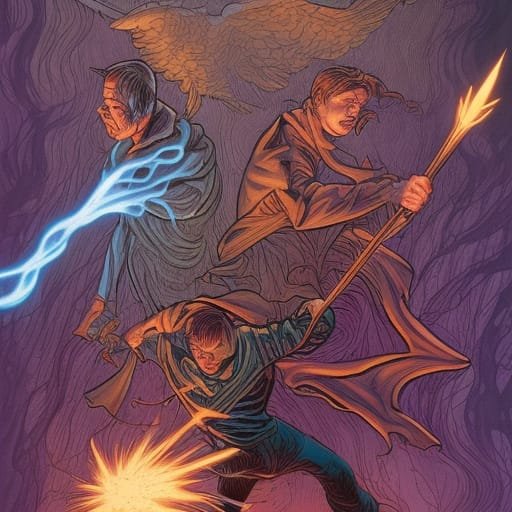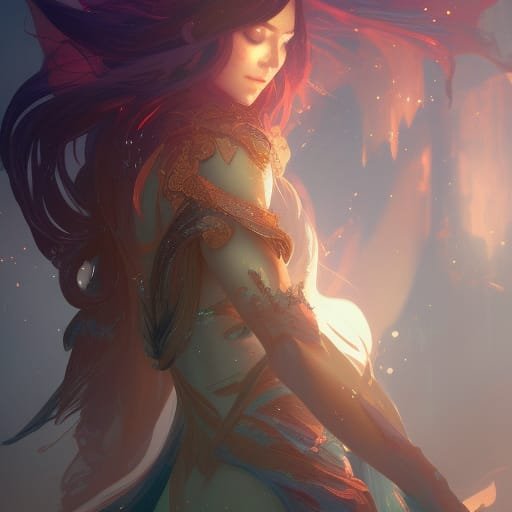The Role of Magic in Fantasy Stories
The role of magic in fantasy stories is a central theme that adds a sense of wonder and the fantastical to the genre.
In this article, I will examine the different aspects of magic and how it is used to create believable and engaging fantasy worlds for readers to enjoy.
We shall look at:
Spells,
Enchanted objects,
Magical beings, and
Magic systems
So, let’s get to it.
Spells:
Spells are the bread and butter of fantasy magic.
They can be used to defeat enemies, heal wounds, or even make someone fall in love. The possibilities are endless, and it's always a treat to see a character cast a spell and see what happens.
One of the most iconic spells in fantasy is the "Expecto Patronum" from the Harry Potter. It's used to ward off Dementors, the soul-sucking creatures that feed on happiness.
The spells of Harry Potter are probably the most famous for the fact they have command words. Many times in other books, including my own, no command word is needed to cast a spell.
Personally, I think using a word to announce to everyone you’re about to cast a spell is foolish. Better to just cast the spell and let your unfortunate victim only realise it once their clothes are on fire!
Enchanted Objects:
Enchanted objects add an extra layer of magic to fantasy stories.
They can be anything from a sword that glows in the presence of danger to a mirror that shows the viewer their true love. They can also be used to give characters special abilities or to help them on their quest. The One Ring from The Lord of the Rings is a great example of an enchanted object that plays a huge role in the story.
Enchanted object are tricky to write though, if you make them too powerful it just ruins the plot. Opposite to that, if you make them too insignificant there is no point in them existing in the first place.
The other big pitfall of enchanted objects is when they start off being really powerful, but as the story progresses they become useless.
I’ve generally avoided enchanted object being too prominent in my stories. The trick I’ve used is to show them as not being unique or important; just another item in a world of fantasy and magic.
Magical Creatures:
Magical creatures are another staple of fantasy stories.
From dragons to unicorns, these creatures add a touch of wonder to fantasy stories. They can be used as allies, enemies, or even as a means of transportation. The dragons from George R.R. Martin's A Song of Ice and Fire series are a great example of magical creatures that play a significant role in the story.
Other times they can be used as a trump card to get the main characters out of a predicament - I’m looking at you LotR and your “eagles are coming” hack. This is fine example of when magical creatures are too powerful for the plot’s own good.
In my own works I steer away from using magical creatures for significant plot tools. Although, they have to be powerful, like dragons, and able to destroy virtually all in their path. I avoided using them as a crutch as much as possible and approached them as something more along the lines of how we see animals in our own world - just another creature in the wider world.
Magical Beings:
Let's not forget about the magical beings themselves, like wizards, witches, and sorcerers.
These characters add an extra layer of intrigue to fantasy stories, and they're often the ones behind the magic that drives the story forward. They're powerful, knowledgeable, and wise, and they're a force to be reckoned with. Gandalf from The Lord of the Rings and Dumbledore from Harry Potter are two iconic examples of magical beings in fantasy literature.
I think a lot of authors make the mistake of making the being the source of the magic, and then making it common in the story. Like Harry Potter, the magic is intrinsically connected to the witch or wizard, and both are everywhere. Lord of the Rings does it better with Gandalf and elves being embodiments of ‘magic’ and then making all the common folk lacking that magic. This makes those characters who are ‘magical’ appear rare and inspiring.
In my work I tried to avoid the ‘magical being’ approach of Harry Potter and made it so almost everyone can ‘use’ magic, but they themselves are not ‘magical’. The only time I make a certain being magical is if they are significant to the plot and are a rarity. This makes clear to the reader that this particular character is important.
Magic Systems:
Lastly, magic can also play a role in the world-building of fantasy stories.
From the way magic is used to the way it's perceived by society in the story, it can add depth and complexity to the world. The Wheel of Time series by Robert Jordan is a great example of a story where the magic system is intricate and plays a significant role in the story's world building.
I have spoken on magic systems previously which can be read here. I go into depth on the topic but as an overview: magical systems are essential to drawing the reader in, and it is essential to create some kind of ‘believability’ to those magic systems
Concluding
The role of magic in fantasy stories is undeniable.
It adds a sense of wonder and the fantastical, and it can be used in countless ways to create believable and engaging fantasy worlds for readers to enjoy.
Whether it's through:
spells,
enchanted objects,
magical creatures,
magical beings, or
magic systems,
the use of magic adds depth and complexity to fantasy stories, making them truly magical and enjoyable to read.
Till next time
PS - Don’t forget to sign up below for updates on new book releases and blog articles. Also, drop by my Patreon and socials


